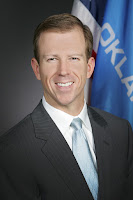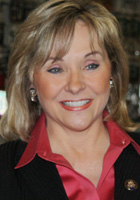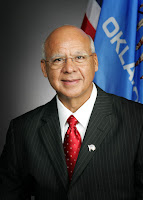That's why our administration strongly supports subgroup accountability in No Child Left Behind. This is one thing that No Child Left Behind got absolutely right. Thanks to NCLB, America can no longer ignore those insidious achievement gaps. We can no longer celebrate the success of one group of students if another group of students is still struggling. We have to be open and honest about where we fall short.
But we also have to be much more thoughtful about how to address our education system's shortcomings, and this is what NCLB got wrong. The law mandates one-size-fits-all solutions, no matter what the size or the scope of the challenge. We all know that Washington cannot dictate solutions to schools at the local level. Instead, we must empower local educators to tailor remedies to the students most at risk. And then we'll hold them accountable. We'll demand that every school, district, and state take full responsibility for every single student and focus on closing achievement gaps instead of merely identifying them.
We have to stop admiring the problem. We will also encourage the kind of best practices that we know are most effective, and at the top of that list of best practices is one simple word: inclusion, and by extension, holding students with disabilities to the same high expectations as everybody else. We know, we absolutely know, that when we keep expectations high, students with disabilities excel.
Just yesterday I was at Beers Elementary School here in D.C., which has done an extraordinary job at inclusion. Their philosophy there is as profound as it is simple. They told me repeatedly that they're preparing all their students for success in one society, not a general ed society and not a special ed one. That world simply doesn't exist.
For too long, the answer to educating students with disabilities was to isolate them and to deny them the same educational experiences that others were having, and thankfully, those days are over. The fact is 60% of our students with disabilities spend 80% of their time in the regular school environment. That's real progress, and there's absolutely no reason that those numbers should not continue to rise as more and more teachers know how to effectively work with students with disabilities. All teachers--all teachers--must be equipped with those skills. At the same time, all of the other important indicators for students with disabilities are rising, from student achievement to high-school graduation to college enrollment rates.
As a country, we are doing a much better job today of serving students with disabilities. Meanwhile, the vast majority of students with disabilities are also part of the same accountability system as everyone else, and that's the way it should be.
I want to say here and now for the record that we are moving away from the 2% rule. We will not issue another policy that allows districts to disguise the educational performance of 2% of students. That's unacceptable, and that must change. We have to expect the very best from our students and to tell the truth about student performance so that we can give all students the supports and the services they need.
And if you look at our 2012 budget proposal and our blueprint for rewriting the federal K-12 education law, it's pretty clear where we stand. We want to boost funding for students with disabilities by $200 million, even in these fiscally challenging times. We also want to increase funding by $50 million for infants and toddlers with disabilities.
We want to protect critical programs serving students with disabilities, including preschool grants, national activity funds, vocational rehabilitation programs, national dissemination and research grants, and supports for institutions serving students with disabilities. We want to fund innovative new research programs to help provide people with disabilities who need accommodations with on-demand access to those accommodations any time, any place there's an Internet connection. We also want to continue to support young people with disabilities as they transition to college and the workforce. Students with disabilities, like everyone else, must be college- and career-ready because we know that the good jobs of the future will require more than a high-school diploma. And when they have the education they need to succeed, they will be self-sufficient and be able to live independent lifestyles.
I want to thank our business partners here today, but it's just so important that we assure all of our workplaces welcome everyone. You understand that the best companies draw on the widest range of skills and talents available. Back in Chicago I have some wonderful partnerships with businesses that made it their business to hire my students with disabilities, and we can't do enough to celebrate them. Please give our business partners another round of applause.
Finally, personally, I want to do a much better job of talking about students and people with disabilities, and this is where I know that I have not always met your expectations. Too often, in the everyday churn of activities, I have overlooked one segment of the student population as I have talked about another one. I talk about students in poverty. I talk about children of color, English-language learners, the homeless, and children who live in rural or remote communities, and sometimes I know I don't talk enough about students with disabilities, and people might wonder if I understand the barriers facing students with disabilities in the classroom and in the workforce, and that's when I think back to my mother's tutoring program in a church basement on the south side of Chicago. I spent almost every afternoon of my childhood in that tutoring program with her. My friends were poor children, all African American, and many of them unable to read when they showed up at her door. Back then, fewer children were being diagnosed with ADD or dyslexia. We didn't have all the resources and supports that thankfully exist today. But we understood something much more basic, much more fundamental: we understood that there was no barrier to learning that we cannot overcome.
There is no disability that is bigger or more powerful than our collective will, and there's no greater hunger than the hunger of a child to learn, and that has nothing to do with disabilities, with race, or with poverty. We're all born with it, we all share it, we all want it, and we all can and must get it. In later years, those students and students like them got the resources and supports they needed--books and accommodation and better technology and better-trained teachers, and they also got the time to learn in their own way, and every single one of them learned. They met our highest of expectations, and many of them went on to do great things. Whether it was the children I grew up tutoring or whether it was relatives and cousins, I was lucky enough to grow up with children who every single day were beating the odds. Witnessing those daily struggles and the tenacity and the courage necessary to overcome them shaped me. We have to have the highest of expectations for every child in every classroom across the country.
That's the understanding we bring to our work in reauthorizing federal laws impacting people with disabilities. Whether it's ESEA, IDEA, the Workforce Investment Act, or the Americans with Disabilities Act, please know that the Obama administration stands with you and that I will remain your champion, your advocate, and your servant. Please know that I will always challenge myself and my team to measure our collective success in terms of all children, not some children, and all people, not just some people. Equality and inclusion are at the heart of the American ideal. They represent our common hopes, our deepest aspirations, and our best values. So I thank you so much for your time tonight. I thank you even more for holding me and others accountable for our words and our actions, and most importantly, I thank you for the hard work you're doing every single day on behalf of America's children and adults with disabilities. Because of you, literally--literally--millions and millions of people with disabilities will reach their full potential, and therefore America will reach hers. Thank you so much and have a great evening.



















